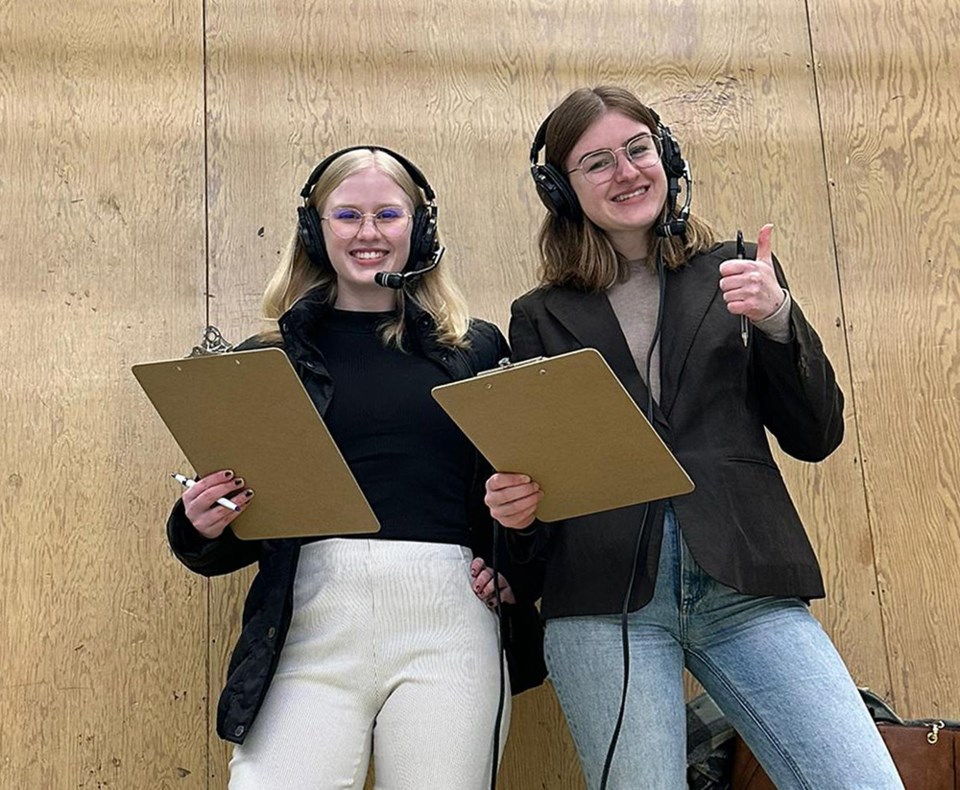Jessica Kissel has been around hockey for most of her 18 years — she started skating almost as soon as she could walk and, at age 12, she was a referee.
But recently, Kissel experienced the sport in a whole new way.
She and fellow BCIT radio student Dominika Kwiatkowski formed the first all-female broadcasting duo for a Pacific Junior Hockey League (PJHL) team when they provided play-by-play and colour commentary for the Port Moody Panthers’ Feb. 11 home game against the Abbotsford Pilots.
Kissel, who’d been the sidekick to regular play-by-play announcer Nick MacDonald all season, was thrust into the game-calling position when her colleague went rinkside for PA announcing duties.
That then elevated Kwiatkowski into the commentary position from her usual behind-the-scenes role on the team’s HockeyTV streaming broadcasts.
@tricitynews Women in sports. 🎙🏒 #tricitynews #portmoody #panthers #pjhl #breakingbarriers #greenscreen ♬ Glass Shattering Sound Effect 2 - Soundsmack
The social media post announcing their unique collaboration was seen more than 53,000 times and even got a reply from Sportsnet host Carly Agro, as well as local broadcasters like Rick Dhaliwal and Vancouver Canucks’ PA announcer Al Murdoch.
Kissel, a first-year student at BCIT, said the experience was a whirlwind that’s really reinforced her love for live broadcasting, and given her food for thought as she considers the direction her career will take after she graduates.
For Kwiatkowski, a second-year student, adding pithy remarks and observations to fill in the pauses that occur during a hockey game was a way to push the boundaries of her comfort zone.
Both said they hope the attention their broadcasting effort has received will be a bit of a clarion call to other young women with aspirations to break through traditional barriers.
While women like Leah Hextall and Jennifer Botterill have been an increasing presence on live sports broadcasts, providing play-by-play and colour commentary from the booth is still the rare exception to the rule.
BCIT broadcasting instructor Brian Wiebe, who happens to also be the general manager of the Panthers, said women looking to break into sports broadcasting face “the antiquated notion that high-level sports are only for men.”
But, Wiebe added, he’s seeing more of his female-identifying students express a desire to break into sports broadcasting.
“Things have changed for the better,” he said. “More women feel there is support for them broadcasting any sport.”
Kissel, who’s originally from Maple Ridge, said, “I think it’s important to have representation. It feels like it’s something you can do, when you see women out there doing things.”
“It can be encouraging,” Kwiatkowski added.
“It makes it a bit more accessible.”
Wiebe said small organisations like the Panthers are perfectly positioned to provide opportunities that can break down barriers.
“It is huge for junior hockey organizations to provide opportunities for people to gain experience in all sorts of roles,” he said. “It’s where successful sports broadcasters have cut their teeth for years.”
Kissel said calling play-by-play, while also developing a rapport with her sidekick, proved challenging at first.
Not only did she have to learn all the names and numbers of the players on the ice, she also had to conjure some unique phrases on the fly to provide her broadcast with personality.
“It was definitely a big transition,” she said.
“You had to learn not to get too caught up in the moment, you just have to be able to move along, keep up with the flow of the game.”
For Kwiatkowski, whose professional interests lean more toward the music industry than sports broadcasting, overcoming her own knowledge gaps about hockey and a fear she was constantly repeating herself proved the most daunting.
Both women said the experience did drive home the importance of a broadcast’s role, even if the audience is just family and friends of the players.
In fact, after their game, the parents of one of the Panthers’ players presented the duo with a card thanking them for their effort, calling their commentary a lifeline when they can’t watch the games in person.
“That’s not something I’d thought of before,” Kissel said.
“It’s a light that helps brighten their lives.”



